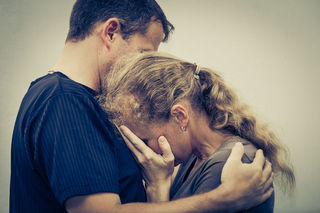Depression
Pregnancy Loss and Depression
Understanding the trauma of fetal loss
Posted February 29, 2012

It's hard for most women to imagine anything worse than experiencing an unsuccessful pregnancy. But 15-20% of pregnancies end in miscarriage and the loss associated with this crisis can be devastating.
Pregnancy, even at its best, can be a time of uneasiness and worry. Research tells us that a woman is most at risk for emotional illness during and after pregnancy than at any other time in her life.
It follows, then, that when a woman experiences a miscarriage, the risk for depression is great. This risk is increased if: a) she has experienced a previous clinical depression b) there is depression in her family c) her support system is weakened or threatened by current circumstances d) external factors add additional stress.
Women who suffer through the loss of a pregnancy know better than anyone how well-meaning friends and family can unintentionally say all the wrong things: "It was meant to be." "It was God's will." "It's better that it happened early." "You can always get pregnant again." "Thank goodness you have your health." And so on. Needless to say, this doesn't help.
Unfortunately, women are often left to suffer alone, because although we expect there to be some stage of "normal grief", most friends and family are eager for her rapid return to a previous level of functioning, perhaps dismissing the depth of her pain. This, in turn, can leave her feeling misunderstood and drive her further into isolation. Understandably, this set of circumstances can create the opportunity for depression to emerge.
A study from the Journal of the American Medical Association (JAMA, 1997) concluded that major depressive disorders are more common in women who suffer a miscarriage than in those who have not been pregnant. Furthermore, they suggest that women who suffer miscarriages should be monitored in the first weeks after reproductive loss, particularly those who are childless or who have history of major depressive disorder. Among miscarrying women with a history of prior major depression, half experience a recurrence. It is also interesting to note that this risk did not vary significantly by maternal age, by time of gestation, or attitude toward pregnancy.
Another study determined that during the first year after loss a) supportive counseling was effective in reducing overall emotional disturbance, anger, and depression; and b) time passing led to increased self-esteem and decreased anxiety, depression, anger, confusion, and personal significance of loss. The conclusion was that the caring attention from counselors as well as the passage of time had positive and significant effects on the integration of loss and improvement of self-esteem in the first year subsequent to miscarrying. This is important because many women feel they need to suffer in silence and may not feel it's appropriate to ask for help or may resist reaching out.
So how do you know if what you are feeling is "normal" grief or depression?
Although no one can put forth rigid parameters, most would agree that there is an "expected" period of normal grief after any loss. This grief reaction would certainly include feelings of depression. If, however, the feelings of depression persist beyond several weeks and being to interfere with your ability to function at home and or at work (sleep disturbance, appetite changes, lingering irritability/anger, chronic hopelessness, persistent anxiety/panic), it would be time for some professional support.
After a miscarriage, some professionals would call the emergence of depressive symptoms PPD (postpartum depression), loosely fitting in to the understanding that PPD is recognized as the presence of clinical depression following childbirth. Others would call it, Depression. It doesn't really matter what we call it. What we need to understand is that the childbearing years are a time of increased risk for onset of depression in women.
After a pregnancy loss, depression is not only understandable, it is also treatable. Women who experience symptoms of depression that do not remit after a couple of weeks, should seek the help of a healthcare professional, either their doctor or a good therapist who specializes in the treatment of women and depression. Depending on the symptoms, depression responds well to psychotherapy and medication, if indicated. In addition to whatever professional or medical support they might need or want, some families find a great deal of support through social media, where they can connect with other families with similar losses. Some women may choose to plant a flower garden, or create a personal memorial or engage in some ritual or service to mark the passing of their child.
Pregnancy, miscarriage or pregnancy loss, infertility, and the postpartum period can tremendously challenge a woman's mental health. We need to be alert to it, attentive to it, and responsive to it when whether we are healthcare practitioners treating these women or whether we are their family and friends who are embracing them during this difficult time.
A woman who has endured the unbearable loss of a pregnancy is suddenly cast into a world of unknowns. This isn't what she expected. Everything has turned upside down. If a clinical depression descends upon her weary soul, her loss and her pain become deeper and darker. Family members, friends, and the medical community should be aware of this potential impact and respond appropriately.
Giving a woman permission to grieve sufficiently can ease the pain of her loss and promote healing.
Copyright 2012 Karen Kleiman, LCSW postpartumstress.com




